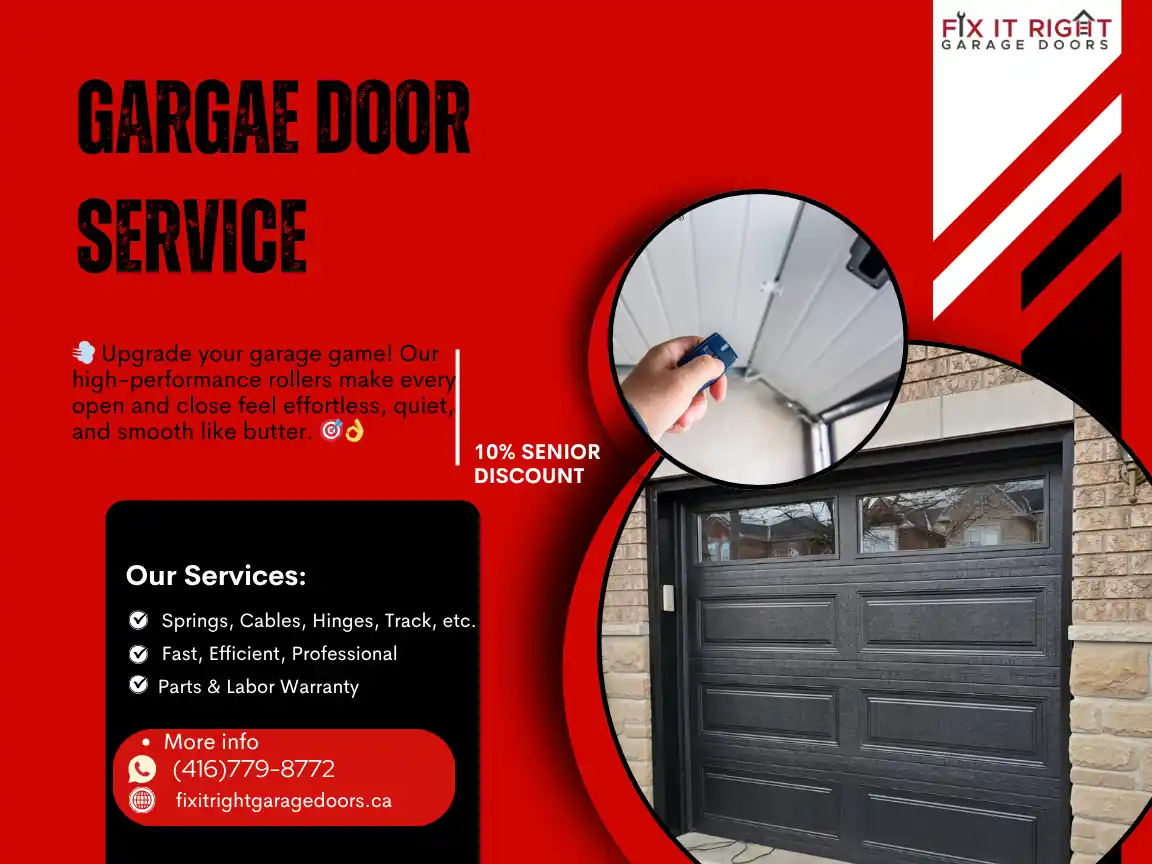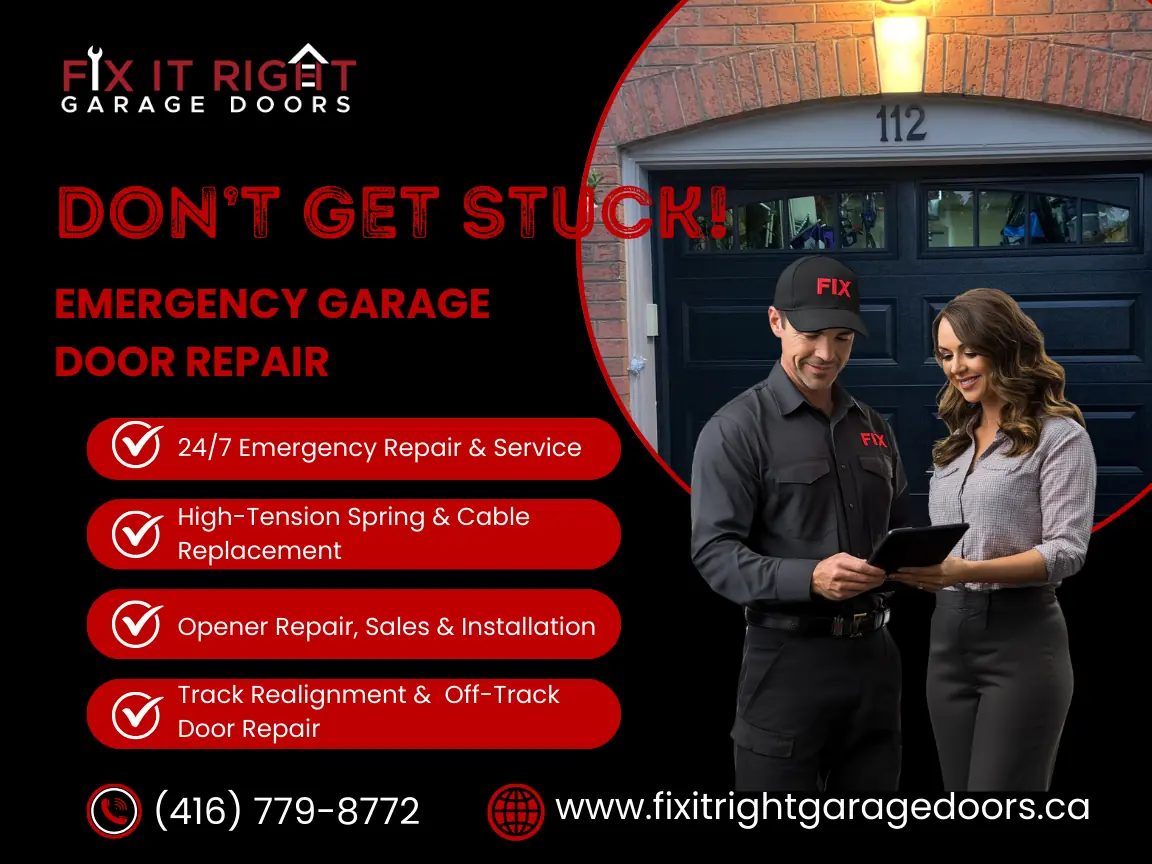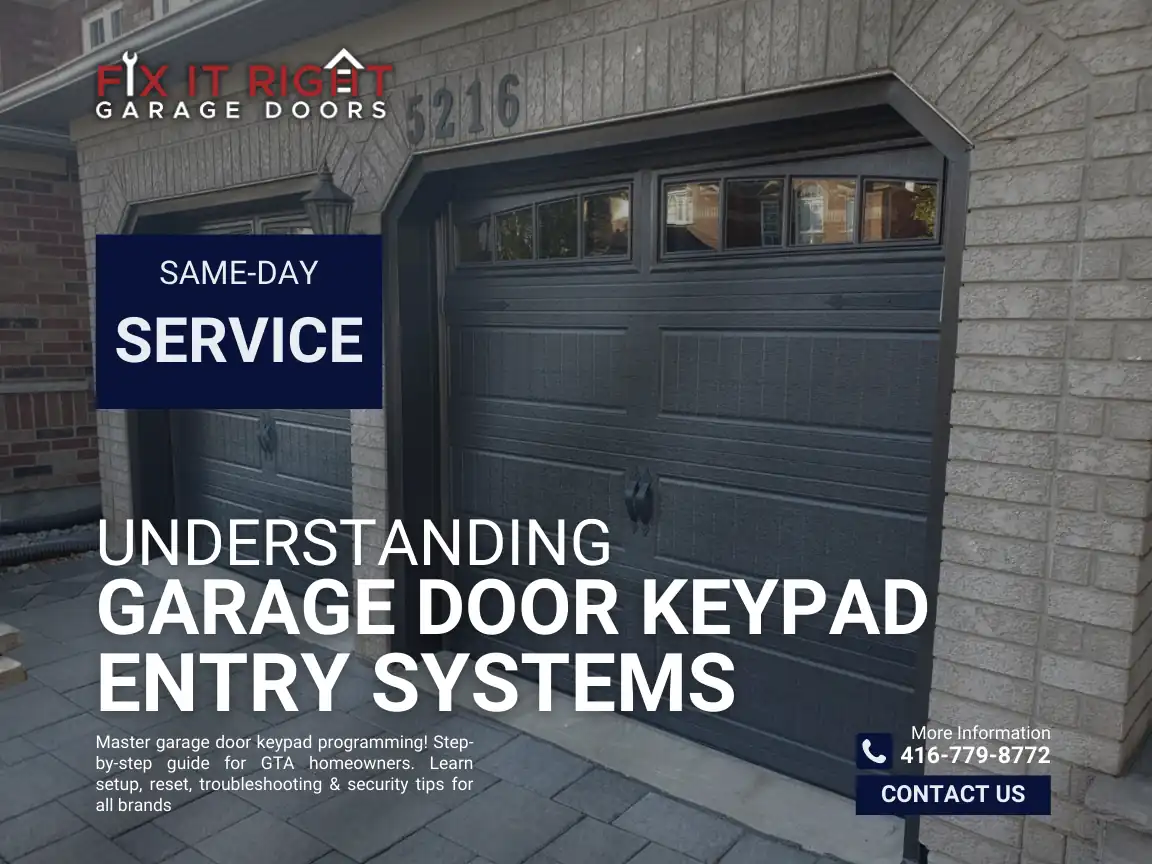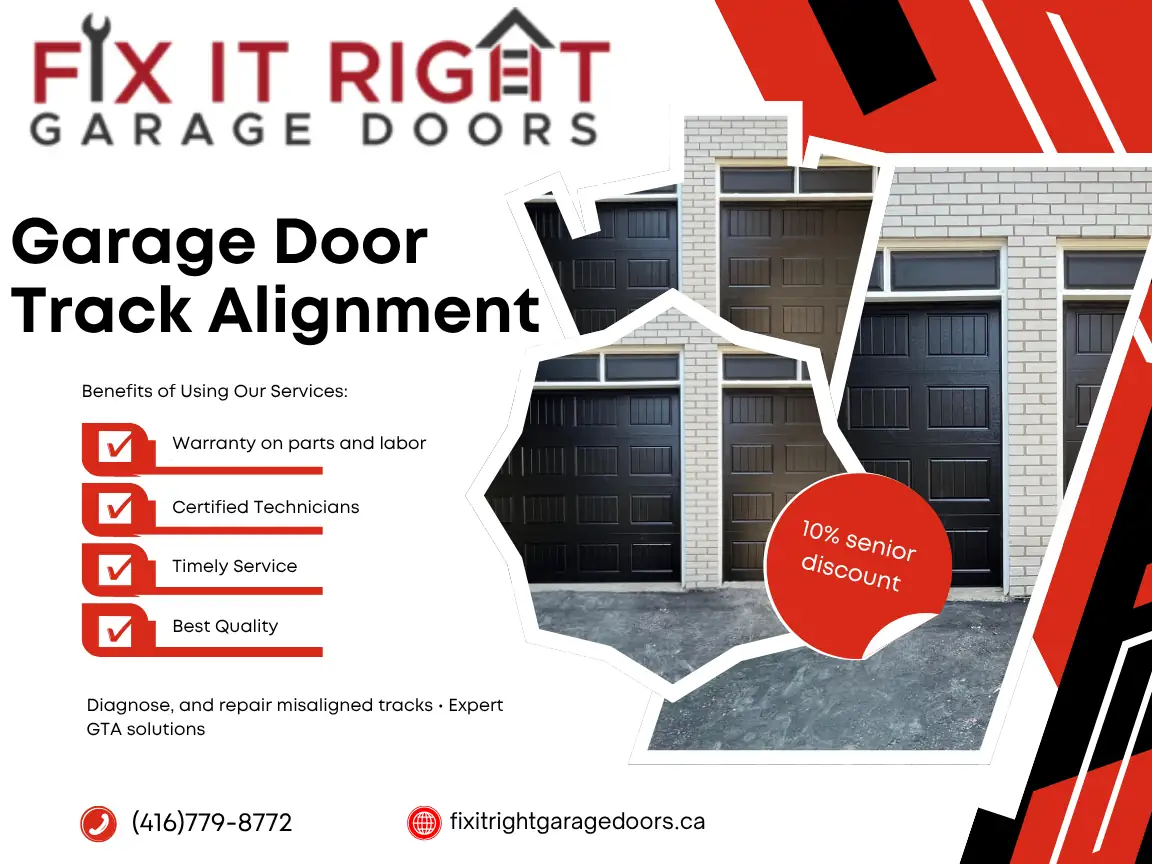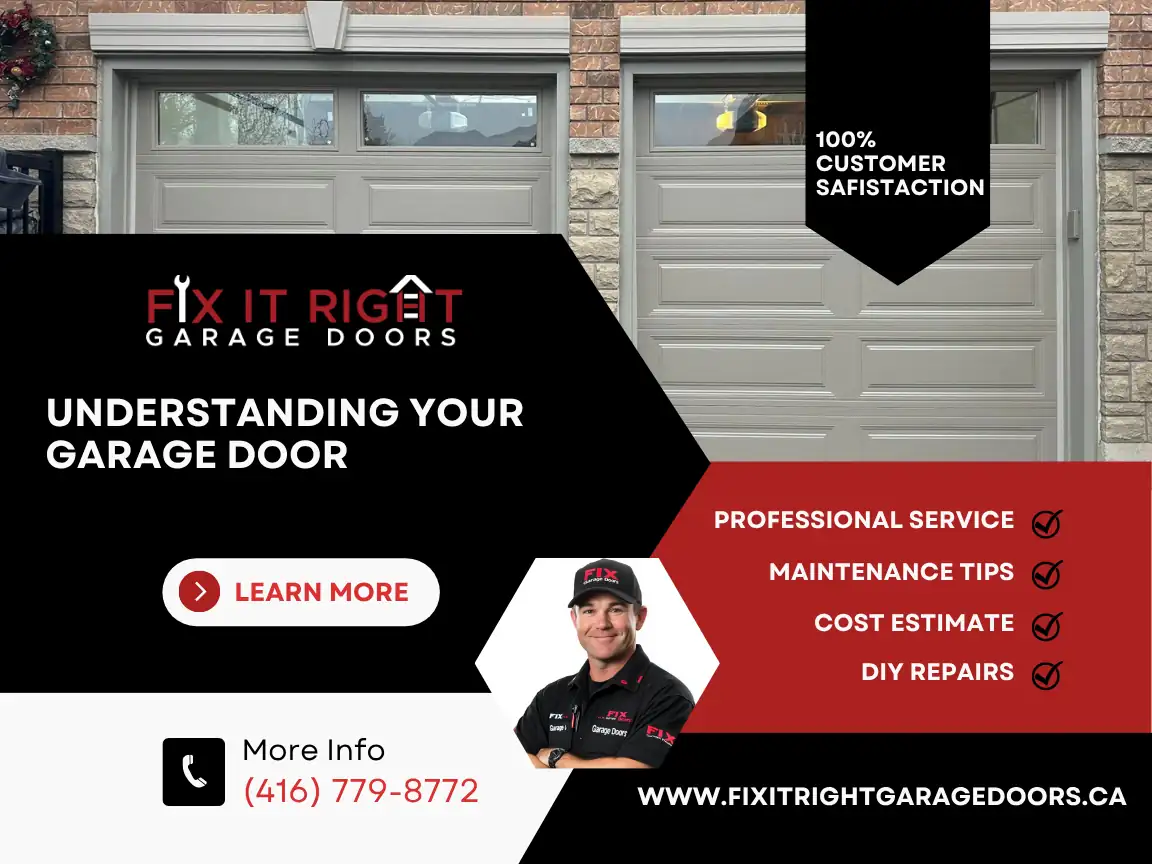Your garage door – it’s likely the largest and heaviest moving part of your home, opening and closing multiple times a day, every single day. We often think about the opener or the springs, but there’s a small, yet mighty, component that truly dictates how smoothly and quietly your door operates: the garage door rollers.
These unsung heroes are what allow your garage door to glide effortlessly along its tracks. When a garage door rollers starts to wear out, it can lead to frustrating noises, jerky movements, increased strain on your opener, and even dangerous malfunctions like your door coming off its tracks.
At Fix It Right Garage Doors, we understand that a smooth-operating garage door is essential for convenience, security, and peace of mind. This comprehensive guide will delve deep into the world of garage door rollers, exploring their different types, signs of wear, why quality matters, troubleshooting common issues, and when it’s time to call the professionals for garage door rollers replacement service.


What Exactly Is a Garage Door Rollers and Why Is It So Important?
A garage door rollers is a wheel-like component, typically made of plastic, steel, or nylon, with a stem that fits into the hinges and track brackets of your garage door. As the garage door moves up and down, the rollers glide inside the vertical and horizontal tracks, guiding the door’s movement.
Their importance cannot be overstated:
- Smooth Operation: They reduce friction between the door and its tracks, allowing for seamless movement.
- Noise Reduction: Healthy rollers ensure quiet operation. Worn rollers are often the primary cause of squealing, grinding, or clunking noises. 🤫
- Reduced Strain on Opener: When rollers move freely, your garage door opener doesn’t have to work as hard, extending its lifespan and saving on energy.
- Safety and Stability: Proper roller function prevents the door from binding, getting stuck, or dangerously coming off its tracks.
Understanding the Types of Garage Door Rollers: Not All Are Equal
Just like tires on a car, garage door rollers come in different materials and designs, each with varying lifespans and performance characteristics. Understanding these types is key to making informed decisions about replacement.
Here’s a breakdown of the most common types you’ll encounter:
- Plastic Rollers (No Bearings):
- Description: These are typically the cheapest and most basic rollers, often installed as standard in entry-level garage doors. They usually have a plastic wheel directly on a steel stem.
- Lifespan: Very short, typically 2-3 years (or around 5,000 cycles).
- Pros: Inexpensive upfront.
- Cons: Very noisy, low durability, prone to cracking and rapid wear, especially in extreme temperatures. Not suitable for heavy doors or frequent use.
- Best For: Rarely used doors in detached, unheated garages, or if budget is the absolute sole concern (though long-term cost is higher due to frequent replacement).
- Steel Rollers (with Ball Bearings):
- Description: These feature a steel wheel with internal steel ball bearings, which allow for smoother rotation. The number of ball bearings (7, 10, or 13) indicates quality – more bearings generally mean smoother and more durable operation.
- Lifespan: 7-10 years (or up to 15,000 cycles) with proper maintenance. Higher quality ones with more bearings can last longer.
- Pros: More durable than plastic, good for heavier doors.
- Cons: Can still be noisy without regular lubrication, susceptible to rust (especially the bearings) if not maintained, and can transfer more vibration.
- Best For: Standard residential doors where durability is desired, but quietness is not the absolute top priority.
- Nylon Rollers (with Ball Bearings):
- Description: These are considered the premium choice. They feature a durable nylon outer shell (which acts as a sound dampener) covering steel ball bearings. They are often available with 10 or 13 sealed ball bearings.
- Lifespan: 12-20 years (or up to 20,000+ cycles), especially those with sealed bearings.
- Pros: Significantly quieter operation (virtually silent), highly durable, excellent resistance to wear and tear, require less lubrication (especially sealed bearings), and handle temperature fluctuations well.
- Cons: More expensive upfront.
- Best For: All residential garage doors, especially those attached to living spaces, frequently used doors, or for homeowners prioritizing quietness and long-term reliability. This is often the best choice for a quiet garage door roller replacement.
This table summarizes the main characteristics of different garage door rollers types:
| Roller Type | Material | Bearings | Typical Lifespan | Noise Level | Maintenance Needs | Cost (per roller) |
| Plastic | Plastic Wheel, Steel Stem | None | 2-3 years | High | Low | Low |
| Steel | Steel Wheel, Steel Stem | Yes (7, 10, 13) | 7-10 years | Moderate-High | Regular | Moderate |
| Nylon (Sealed) | Nylon Wheel, Steel Stem | Yes (10, 13) | 12-20+ years | Very Low | Minimal | Higher |
For more detailed information on types of garage door rollers and lifespan, you can explore various resources. A helpful comparison between steel vs. nylon garage door rollers can also aid your decision.
Signs Your Garage Door Roller is Failing: Don’t Ignore the Warnings!
Your garage door will almost always tell you when its rollers are starting to fail. Ignoring these warning signs can lead to more severe damage to your entire system.
Look and listen for these indicators:
- Excessive Noise: This is the most common and obvious sign. Squealing, grinding, loud rattling, or popping sounds during operation usually point directly to worn-out rollers, especially if you have steel or plastic rollers. 📢 Learn how to know if your garage door rollers are bad by listening for these noises.
- Jerky or Uneven Movement: If your garage door shudders, shakes, or appears to get stuck at certain points along the track, your rollers are likely struggling to glide smoothly. One side might move slower or higher than the other.
- Visible Wear and Tear: Conduct a visual inspection. Look for:
- Cracked or Chipped Wheels: Common with plastic rollers.
- Flat Spots: If the wheel is no longer perfectly round, it will cause bumpy movement.
- Worn Bearings: For steel rollers, the bearings might be worn, causing the wheel to wobble on its stem.
- Rust: Rust on steel rollers (especially the bearings) can significantly impede movement and reduce lifespan. These are all signs your garage door rollers need replacement that you should watch for.
- Rollers Jumping the Track (or Door Coming Off Track): This is a serious safety hazard. If rollers frequently come out of the track, it’s a strong indicator of severely worn rollers, track misalignment, or both. Do NOT operate your door if this happens.
- Increased Strain on the Opener: If your garage door opener sounds like it’s working harder than usual, or if it slows down noticeably, it could be compensating for the added friction caused by failing rollers. This can shorten your opener’s life.
If you notice any of these signs, it’s time to consider a garage door roller replacement.
DIY vs. Professional Garage Door Roller Replacement Service
Replacing garage door rollers can seem like a straightforward task, and some middle/top rollers can be a DIY project for those comfortable with mechanical tasks. However, safety is paramount, and there are critical differences in replacing different rollers.
DIY Considerations (for middle/top rollers ONLY):
- Safety First: Always disconnect power to the opener. Use C-clamps or vice grips to secure the door firmly to the track above the roller you are working on to prevent accidental movement.
- One at a Time: Work on only one roller at a time to maintain door stability.
- Tools: You’ll need basic wrenches, pliers, and possibly a pry bar.
- Process: Support the door, remove the old roller, insert the new one, and then move to the next.
When to Call a Professional for Garage Door Roller Replacement Service:
- Bottom Rollers: These rollers are connected to the very bottom brackets of the door, which are under extreme tension from the garage door cables and springs. Attempting to replace bottom rollers without specialized tools and training is extremely dangerous and can lead to severe injury from suddenly released tension or a falling door.
- Door Off Track: If your door has already come off its tracks, it’s highly unstable. Attempting to fix this yourself can cause further damage or collapse.
- Bent or Damaged Tracks: If track issues are contributing to roller problems, simply replacing rollers won’t solve the underlying issue. Professionals can diagnose and correct track alignment or damage.
- Lack of Experience/Confidence: If you’re not comfortable working with mechanical systems under tension or heavy objects, it’s always best to call a professional.
- Comprehensive Inspection: A professional garage door roller replacement service will include a full inspection of your entire system (springs, cables, tracks, opener) to ensure everything is balanced and working optimally.
For safe and effective garage door roller replacement, especially for bottom rollers or if you’re uncertain, please give Fix It Right Garage Doors a call for further information or to book with us! Our expert technicians are equipped to handle all roller types safely and efficiently.
The Cost of Garage Door Roller Replacement
The garage door roller replacement cost can vary based on several factors:
- Number of Rollers: A typical residential garage door has 10-12 rollers. Replacing all of them at once (highly recommended for uniform performance and longevity) will cost more than just one or two.
- Type of Roller: As seen in the table above, plastic rollers are the cheapest, while high-quality nylon rollers are more expensive. Investing in better rollers upfront reduces future replacement frequency.
- Labor Costs: These vary by service provider.
Generally, for a professional garage door roller replacement service in Canada, you can expect the cost to range from $120 to $250 for a standard residential door (parts and labor included) if replacing all rollers. Individual rollers can cost between $5-$33 (CAD) depending on the material. While DIY materials might be cheaper ($25-$55 for a full set), the safety risks and need for proper tools often make professional service a more cost-effective and safer choice in the long run. For a more detailed breakdown of typical garage door roller replacement costs, Angi provides useful insights.
Maximizing Roller Lifespan: Essential Maintenance
Even the highest quality garage door roller benefits from regular maintenance. This helps prevent premature wear and ensures quiet, smooth operation.
- Clean the Tracks (Regularly): Dirt, dust, and debris accumulate inside garage door tracks. Use a damp cloth to wipe them clean. Never grease or oil the tracks themselves, as this will only attract more grime.
- Lubricate Rollers (Annually): For steel rollers, apply a silicone-based garage door lubricant to the ball bearings (where the wheel meets the stem). For nylon rollers with sealed bearings, less frequent lubrication (every 1-2 years) is usually sufficient, focusing on the stem insertion point. Avoid using WD-40, as it attracts dust and dries out. Learn more about tips and tricks for maintaining your garage door rollers and other garage door components.
- Visual Inspection (Monthly): Regularly check your rollers for signs of wear (cracks, flat spots, wobbling), rust, or debris. Early detection allows for timely replacement before major issues arise.
- Professional Tune-Up (Annually): Schedule an annual professional garage door inspection. A technician will not only lubricate and inspect your rollers but also check your springs, cables, and track alignment, ensuring your entire system is balanced and operating optimally. This proactive approach catches minor issues before they become major problems, extending the lifespan of all components, including your garage door rollers.
Choose Fix It Right Garage Doors for Your Roller Needs
Your garage door roller is a small component with a huge impact on your garage door’s performance. Don’t let worn-out rollers lead to annoying noises, sluggish operation, or dangerous malfunctions. Upgrading to high-quality rollers, especially durable nylon ones, can drastically improve your garage door experience, making it quieter, smoother, and extending the life of your entire system.
At Fix It Right Garage Doors, we specialize in expert garage door roller replacement service. Our certified technicians can quickly diagnose issues, recommend the best type of rollers for your needs, and perform safe, efficient replacements. We’re committed to ensuring your garage door operates at its peak performance.
For a quiet garage door roller replacement, professional inspection, or any other garage door service, please give Fix It Right Garage Doors a call today! We’re here to help you enjoy a smoother, quieter garage door experience. 📞

